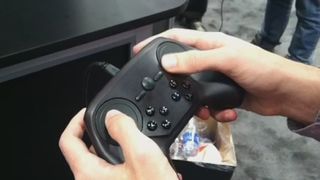Steam Controller hands-on at GDC 2014

The new version of Valve's Steam Controller is out in the open at GDC, playable for anyone in attendance. We've spent some time with it on the show floor, playing Portal 2, Broken Age, Dirt 3, and Strider.
This was my first time using the Steam Controller, Valve's gamepad “designed to work with all the games on Steam: past, present, and future,” and meant as a companion to SteamOS. Our last chance to play with the controller was at CES in January , when Cory said that he was “hopeful after an admittedly short playtime that such a device could be fantastic.”
My experience was far less encouraging. I was able to fit in more than half-an-hour with the controller on the GDC show floor. I played every game that Valve had on display—one from four different genres—and in each, I would've absolutely had more fun and been more effective with an Xbox 360 controller.
The high sensitivity of the controller's dual, haptic trackpads was constantly frustrating. In Dirt 3, it was very hard for me to make fine steering adjustments; I seemed to only be able to oversteer left or right. As a result, my driving method boiled down to essentially see-sawing left, then right, then left again to correct and then over-correct my oversteering. I crashed a lot. My car was a wreck by the time I crossed the finish line, a lap time of 6:55 on Dirt 3's Lake Gratiot course. The top AI racer finished in 3:04. Trying it mid-race, I actually drove best while using the Steam Controller's new d-pad.
Portal 2, one of the games using native support of the pad (as opposed to mouse and keyboard emulation) wasn't much better. I was able to clumsily and inelegantly solve a room in the first couple hours of the game, one where you're moving reflector cubes to change the direction of lasers emanating from the wall. When I put my thumb at the edge of the right pad, which controls your aim with the portal gun, it doesn't perpetually rotate your character. If I wanted to make a 90 or 180-degree turn, I had to swipe the pad right-to-left or left-to-right. And as I did that, the vertical alignment of my aim would shift a little, and I'd have to correct it. I felt like a loading crane, moving along one axis at a time, picking up an item, rotating, and then moving again. It was so hard to be swift. I gave up after dying twice in the following room, where I needed to use orange (acceleration) and blue (bounce) gels to advance. It was a struggle to simply pan the camera downward, toward my feet, so that I could check that I was making impact with the blue gel.
I'm glad to chalk some of my errors up to my inexperience with the device, but it's surprising how unwieldy the trackpads were in every situation. I didn't once feel comfortable, in control, or that Valve's hardware configuration was in any way an upgrade over a controller with analog sticks. I watched a lot of other players use the controller for the first time, and almost all of them echoed some version of “The pads are way too sensitive.” Valve employees scattered around the kiosks emphasized that you'll be able to adjust the sensitivity to a greater degree once the controller is fully released, but it's curious that Valve would showcase the controller in such a clearly unpolished stage—everyone I saw using it at GDC seemed to be having a tough time.
The Steam Controller didn't strike me as either a good fit for casual, undemanding games as an upgrade to the Xbox 360 pad in first-person, 3D games. I thought that Broken Age would be a safe, easy context, but it was just as frustrating as Dirt 3 and Portal 2. How is that even possible? It was a fight just to put the cursor exactly where I wanted, and overshooting static objects made me feel completely silly.
The biggest gaming news, reviews and hardware deals
Keep up to date with the most important stories and the best deals, as picked by the PC Gamer team.
At least at the outset of using this prototype, the new ABXY buttons feel shoehorned into the architecture of the pad. It's an odd placement for them, and they're maybe 80 percent the size of an Xbox 360 pad's buttons. I have pretty big hands, and the X button felt too distant to me. Even as I was navigating menus, I kept hitting B (cancel) when I meant to hit A (confirm). At the very least, I think it's a configuration that's going to require you to un-learn some of your muscle memory, which is unfortunate.
It's evident that the Steam Controller is still in development. At this prototype stage, Valve is actually still 3D printing the body of the controller itself, and the rigid, low-quality plastic doesn't quite feel comfortable. From a gameplay perspective, though, I'm completely unsold on the Steam Controller as a viable way of playing PC games at this time. The games Valve had on display weren't flattering uses of the controller, and it's disappointing to know that I would've played better with an Xbox 360 pad in every case.

Evan's a hardcore FPS enthusiast who joined PC Gamer in 2008. After an era spent publishing reviews, news, and cover features, he now oversees editorial operations for PC Gamer worldwide, including setting policy, training, and editing stories written by the wider team. His most-played FPSes are CS:GO, Team Fortress 2, Team Fortress Classic, Rainbow Six Siege, and Arma 2. His first multiplayer FPS was Quake 2, played on serial LAN in his uncle's basement, the ideal conditions for instilling a lifelong fondness for fragging. Evan also leads production of the PC Gaming Show, the annual E3 showcase event dedicated to PC gaming.
Most Popular







